The Washington Commanders’ potential return to their historic home in the District of Columbia has been the subject of much anticipation and hope. Once perceived as a strong possibility, recent shifts in legislative dynamics have left the team and its supporters grappling with uncertainty. As discussions around a new spending bill unfold, critical components related to the transfer of land from the federal government to the district have been significantly altered. This development raises questions about the Commanders’ future and whether they will reclaim a site with deep-rooted historical significance.
The latest spending bill, which is designed to fund the government, lacks a vital provision that initially sparked optimism among team officials and city stakeholders — the transfer of approximately 170 acres of federal land that encompasses the RFK Stadium site. Originally included in the discussion, this provision’s exclusion is a disheartening blow to efforts aimed at revitalizing the area and establishing a new football stadium. With Congress opting for a different approach in their latest draft, the immediate prospects for the Commanders returning to RFK seem bleak.
Mayor Muriel Bowser provided clarity around the funding situation when she corrected misinformation regarding federal financial allocations for stadium construction. Contrary to claims made by Elon Musk on social media, she emphasized that no funds were designated for a new stadium within the ongoing resolution. Instead, the focus of the conversation is shifting towards urban renewal, including addressing blighted areas and potential renovations for existing sports facilities, like the Capital One Arena.
The RFK Stadium site holds nostalgic value for this franchise. The Commanders played there from 1961 until 1996, periods during which they celebrated five Super Bowl appearances and clinched three championships. In an era marked by triumph and a passionate fan base, the connection to RFK is woven into the team’s identity. However, since relocating to Landover, Maryland—home of the current FedEx Field—the Commanders have struggled to replicate the same loyalty and cultural significance associated with their former stadium.
If the land transfer were to find its way back into new legislation, the Commanders’ aspirations for returning to RFK would gain substantial momentum. Sources indicate that a 99-year lease on the land from the federal government would provide the stability needed for the Commanders to invest in their future, including much-needed developments for a new stadium. Nevertheless, there remains a frustration among stakeholders regarding the delays and complexities inherent in navigating the political landscape to secure these public assets.
For now, the Commanders are left with fewer alternatives, particularly those involving their existing site in Maryland. While they already possess the land for development, questions loom about whether they will prioritize building there or continue to pursue the RFK site as a viable option. Maryland Governor Wes Moore has reiterated his commitment to keeping the team and supporting development in the event of a move, yet the uncertainty around legislative action throws a shadow over these discussions.
As the Commanders set ambitious targets for new infrastructure—expressing a desire for a new stadium by 2030—no definitive pathway currently exists to achieve those goals without significant intervention from lawmakers. Mayor Bowser expressed her concerns, noting the difficulty in planning a new stadium with the existing limited lease, firmly articulating the need for urgent legislative attention.
As discussions surrounding the Commanders’ return to RFK Stadium continue, time will be the determining factor in shaping the outcome. The possibility of addressing blight in a significant part of the nation’s capital holds promise, yet it remains contingent upon the political will and collaborative effort from both parties within Congress. As the city waits with bated breath, the Commanders’ legacy teeters on the cusp of potential revitalization or continued stagnation. The need for change is urgent, and the allure of RFK Stadium beckons, echoing the triumphs of a bygone era while inviting new possibilities for the future.

